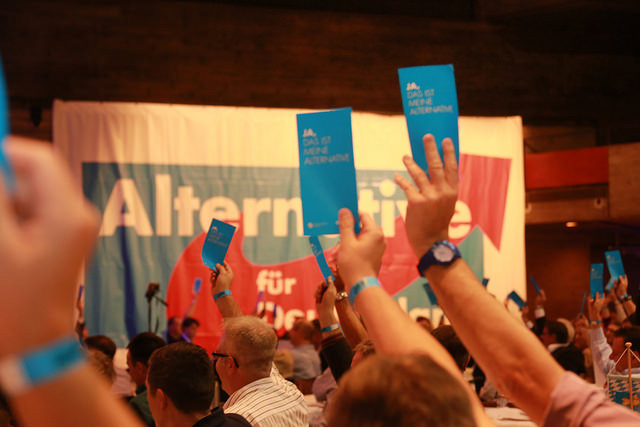
Germany has a new Right. It is strong, it is represented in nearly every state parliament, and, according to all predictions, it will move into the Bundestag in the coming year. The Federal Republic has been turned on its head ever since Angela Merkel’s government, in agreement with Austria, let 250,000 refugees, mainly from Syria, into the country last year in September. The chancellor coined the phrase, “we can do it,” to emphasize that one of the richest countries in the world has a responsibility, especially to war refugees who have escaped an inferno only with their bare skin. After two lost elections in federal states of Germany, Ms. Merkel distanced herself from the phrase. According to her, too many have interpreted it way to heavily, stretching its simple meaning way too far.
There have always been Right-wing movements inside parliaments in post-war Germany. But the experience of two world wars and the ravages of the holocaust have caused the country, at least in the west, to confront its past, and by doing so it has for decades prevented a Right-wing force from being able to permanently establish itself. The eastern part of the country still fights over what way is right to recover from the Communist tyranny and dictatorship, which held East Germany under its control until 1989. Since Reunification and the fall of Soviet Communism, the Left-wing has always been very strong in this part of the country, but there have also always been Right-wing movements. The National Democratic Party (NDP), the successor party to Adolf Hitler’s NSDAP, even made it into a regional parliament. There is a lot of swing-voting coming on between the far-left and the far-right, one could argue this is due to the fact the NSDAP includes the terms national and socialist.
Now it is the AfD, the “Alternative for Germany,” which as a political party expands the party spectrum to the right and gains 15 percent of the vote in elections in the west of the country, while in the east they are up to 23 percent. The new Right-wing extremism is, for the first time since the Reunification, unfortunately, from a holistic perspective almost perfect. The Germans voting for the AfD are unified in their rejection of Islam and refugees. They stand, like many Right-wing movements in Europe, for closed borders and skepticism of the EU and the common currency, the euro. In the election in the home state of Chancellor Merkel, in Mecklenburg-Vorpommern, the party was even stronger than Merkel’s conservative party. In the most recent election in the state of Berlin the Conservatives lost quite a bit, and the AfD at almost 15 percent. Due to this losses it is still open if Ms. Merkel will be running in next years federal elections as candidate for her party. Analysts say the refugee topic will dominant politics also in 2017.
The Alternative for Germany has a strong extra-parliamentary arm that ravels the anger of the street against refugees and Islam. It calls itself Pegida, which is an abbreviation for Patriotic Europeans against the Islamization of the “Abendland,” a word which in German is a historical synonym for Christian Europe. The term stands for a homogeneous, monolithic societal constitution. A survey by the University of Göttingen at the Pegida rallies, demonstrating every Monday in various German cities, found that most participants are male, about 50 years of age, and have no religious affiliation. So far so good. But now here comes the amazing thing: many of them boast that they are doing well economically, or even better than they were a decade ago. They express a fear that this will soon no longer be the case. For once, the Germans are smitten by the proverbial “German Angst,” as the condition is called in English.
In this condition, the otherwise very rational Teutons are being driven by their emotions, by their gut feeling. This alone is the reason why the AfDers and the Pegidas can break the nation out and summon back Christianity. Their rhetoric falls on the ground of fear. Germany’s far-Right is thus the last of the major European countries to enter the group of movements, which wants to declare the feeling of rejection towards everything foreign as a form of virtue and as a standard for political action. For they see the clash of civilizations as a fact. Their goal is to avert the fall of the West brought on by Islam. Their rhetoric is sometimes reminiscent of the Third Reich. Anyone who has been stranded on a desert island for a year would no longer recognize Germany in the Fall of 2016.

